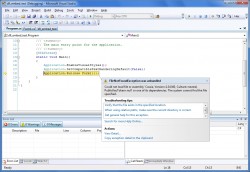Keyloggers
Keyloggers are either small programs or small hardware devices that mainly do one thing- record any and all keystrokes that may be typed in by a user. In the case of espionage, a device is used to capture keystrokes by placing it at the end of a keyboard cable, whereas another kind can be soldered right into the keyboard’s circuit board.
In terms of spyware, keyloggers can be distributed and installed on a computer system by means of a Trojan, virus or worm.
Malware
Interestingly enough, the prefix for this term in both the French and Spanish languages translates to “bad”. No argument here about that description. It has also been stated that the term has been shorted from the word “malicious” and combined with the word “software”. Either way, malware is software that intentionally causes harm on a computer system. Malware should not be confused with faulty software containing bugs; for bugs, no matter what the problem may be, are not intentional.
It is difficult to specifically classify malware, since other types of spyware tend to overlap with it. Viruses, trojans and worms all fall into this category.
A less common form of malware that doesn’t really fall under any other categories and engages in self-replication is referred to as a “wabbit”. It doesn’t self-replicate from system to system, but rather, uses a simple recursion algorithm to replicate itself indefinitely to clog up system resources until the system is rebooted. Any first year application programmer has the ability to create one.
Spyware
Overlapping with the extreme form of adware, spyware is more engaged in unethical and explicitly illegal purposes. These activities can include spying on a user’s surfing habits for marketing purposes, as well as anything else coming under the heading of “spyware”, where each activity is explained under the associated form of spyware in this article.
Unprotected Windows-based computers can rapidly accumulate a surprising about of spyware components. Awareness, tighter system security and establishing a practice of more cautionary browsing habits can help alleviate the problem.
Spyware is not known to cause outright system destruction or replication, unlike a virus infection, but it functions more as parasite that sucks up system resources. In most cases, the user is not at all aware that spyware is installed, and assumes that it is the hardware that is no longer up to par. Usually executing at startup, spyware runs in the background, sometimes causing a huge drop in performance, system stability (crashes, lock-ups and hangs), and available bandwidth on Internet connections (because it is flooded to capacity). These results are mainly unintended by-products of having a large amount of spyware flood a computer system. The direct damage caused in this respect is merely incidental (discounting the result of privacy invasion). However, some forms of spyware integrate themselves into certain operating system files and can cause a mired set of problems if the files are purged outright. This makes it even more difficult and time-consuming task to completely clean a computer system and have everything in fine working order afterwards.
Users who are not aware of the cause of all these problems sometimes ditch their infected computer and go out and buy a new one. That is a waste of money, as well as a waste of perfectly good computer. Either awareness or a visit to a PC technician can help take care of a spyware-infested system. Spyware has caused more visits to PC technicians than any other problem in the last couple of years, and it continues to grow.




 AdamTheTech.com and respective content is Copyright 2003-2026.
AdamTheTech.com and respective content is Copyright 2003-2026.